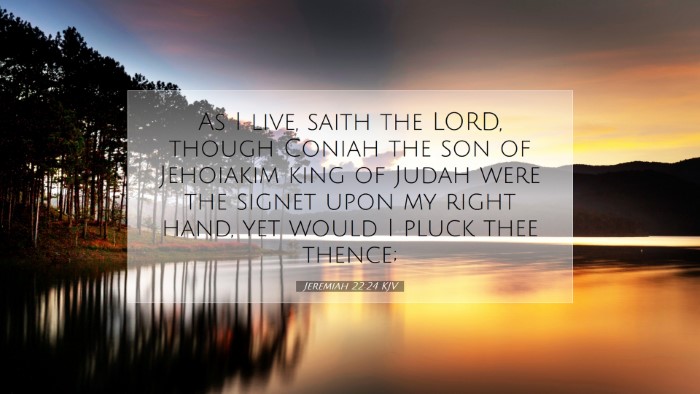Commentary on Jeremiah 22:24
Jeremiah 22:24 states:
"As I live, saith the Lord, though Coniah the son of Jehoiakim king of Judah were the signet upon my right hand, yet would I pluck thee thence."
Introduction
The verse stands as a declaration of God's sovereignty and also serves as a disillusionment of Israel's expectations of their leaders. It highlights the prophetic warning against reliance on human authority and the consequences of disobedience. This commentary draws together insights from prominent public domain commentaries to provide a comprehensive examination of the theological implications of this verse.
Contextual Analysis
Jeremiah's prophecies often reflect the historical and spiritual state of Judah during a period marked by moral decline and idolatry. King Jehoiakim, also known as Eliakim, represents a leadership that has strayed from the divine mandates. His son, Coniah (or Jeconiah), pointed to an even deeper lineage of rebellious kings. The verse is significant as it pronounces judgment against Coniah, symbolizing a future judgment on the Davidic line.
Historical Background
To understand this passage fully, one must consider the historical backdrop. The kings of Judah had been given the promise of an everlasting dynasty (2 Samuel 7:16), yet their continual disobedience to God led to a breaking of that covenant. The phrase "though Coniah were the signet upon my right hand" conveys the idea of authority and significance in the divine plan, yet God asserts His power to remove even what is considered invaluable.
Theological Insights
-
Sovereignty of God: God's words in Jeremiah 22:24 reflect His absolute sovereignty over nations and leaders. Matthew Henry states that God can remove those in power regardless of their status and the human perception of their importance.
-
Judgment Against Sin: This verse encapsulates the theme of divine judgment present throughout Jeremiah's ministry. Albert Barnes notes that Coniah’s removal is a prophetic act that underscores the consequences of national sin and individual rebellion against God.
-
The Futility of Reliance on Human Leaders: Adam Clarke emphasizes the spiritual lesson that relying on even the most esteemed leaders or systems will ultimately lead to disappointment if they are not aligned with God's ways.
Key Phrases and Their Meaning
Examining the key components of the text can reveal deeper meanings:
-
"As I live, saith the Lord": This phrase establishes the authenticity and authority of God's assertion. It implies certainty and commitment, reinforcing that God's promises and threats are grounded in His eternal nature.
-
"Coniah the son of Jehoiakim": The mention of these kings links the passage to the historical context of Israel's decline. It serves to remind the nation of the leadership failures that have led them away from divine truth.
-
"the signet upon my right hand": A signet ring denotes authority but also implies responsibility. The imagery suggests that Coniah would have been an essential part of God’s plan had he remained faithful; however, disobedience voided that privilege.
Applications for Study and Ministry
This verse contains timeless truths applicable to various spheres of life, including pastoral practice, theological studies, and personal spirituality.
For Pastors
Ministers should heed the warning of reliance on personal charisma or congregational support when fulfilling their divine calling. They must emphasize that true authority comes from alignment with God's will rather than human accolades.
For Theologians
Theological discourse can benefit from this verse by examining the implications of divine judgment and sovereignty over human agency. It encourages an in-depth exploration of the covenantal promises and their fulfillment in light of Christ.
For Students of the Word
Students should reflect on the dangers of complacency in faith and recognize that nominal adherence to spirituality without genuine repentance may result in divine abandonment.
Conclusion
Jeremiah 22:24 serves as a profound reminder of the gravity of leadership, covenant, and the nature of God's justice. The prophetic declaration against Coniah invites all readers to reflect on their loyalty to God and the authority upon which they base their lives. The implications of this verse resonate through the ages, calling both leaders and laypersons to a fervent faith and unwavering commitment to divine truth.


